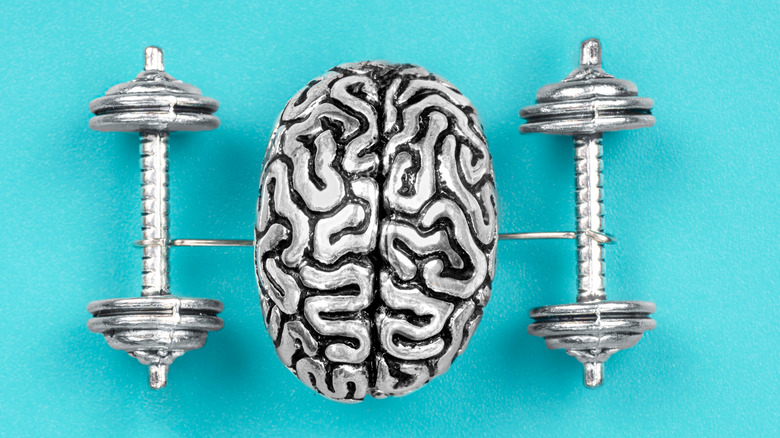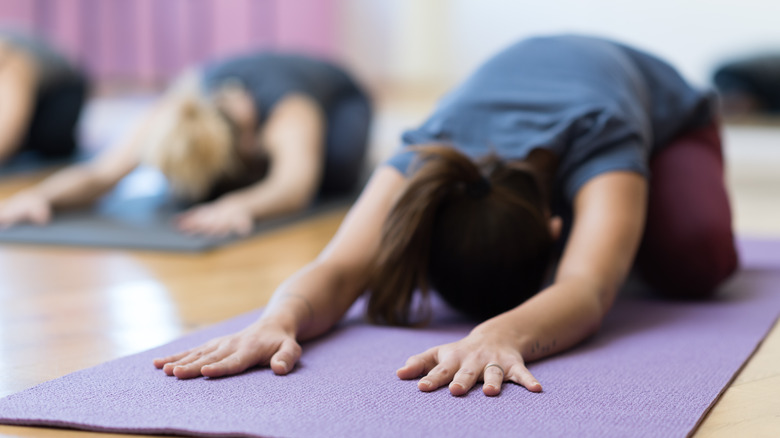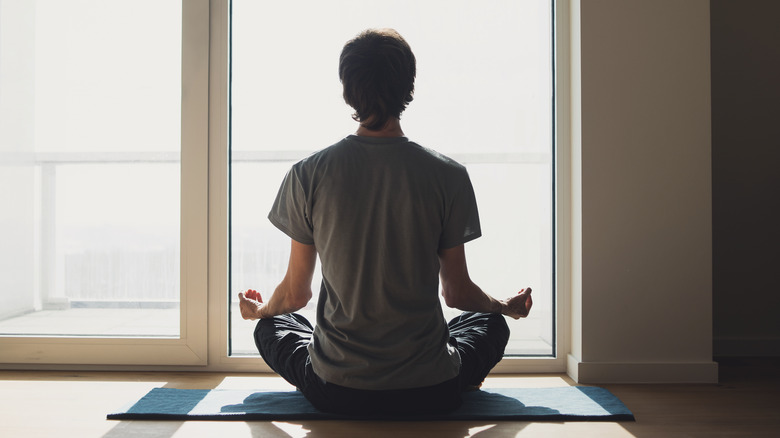Exercises You Need If You Want To Boost Your Mental Health
Mental illness is a severe health crisis that often goes misunderstood by people who don't deal with it. The National Alliance on Mental Illness (NAMI) estimates that 48 million people experience anxiety and 19.4 million people experience major depressive episodes annually. Those are some big numbers, and they don't even begin to scratch the surface of the many other mental ailments that people worldwide suffer from.
Fortunately, talking about mental health has become more of an open conversation over the past several years (via Health Partners). As a result, people are beginning to prioritize their mental health, and exercise may be one of the best ways to do it. As clinical psychologist James Blumenthal tells the American Psychological Association (APA), "There's good epidemiological data to suggest that active people are less depressed than inactive people. And people who were active and stopped tend to be more depressed than those who maintain or initiate an exercise program."
What exercises are best for the brain, and how do they help? We're glad you asked. Check out some exercises to add to your workout or wellness regimen to boost your mental health.
Stretching relieves tension and stress
When you get stressed, you probably feel it in your body. For some, a headache or stomachache can indicate current stress (per The American Institute of Stress). For others, muscle tension, especially in the neck, shoulders, and back, can signal the need to relax. This happens because your muscles respond to stress in a way that protects them from injury. When stress is no longer present, you will probably relax — but if you're under chronic stress and your muscles have no chance to release, you'll feel the toll.
No one wants to deal with the pain associated with muscles that won't relax, which is why stretching is a crucial exercise to weave into your regular routine. An excellent stretch that most people can do is a popular yoga move called Child's Pose (via Everyday Health). To do it, kneel on the floor with your feet together and knees apart. Then, walk your hands out in front of you to lower your chest. Breathe in and out deeply until you feel relaxed. Other stress-relief stretches include a lying glute stretch and a seated spinal twist.
Dancing is good for the soul
Not many things beat the feel-good bliss you get while listening to your favorite song and dancing like no one's watching. And, while your number-one tune can lift your spirits, there are also some real benefits to dancing, and they're not just physical. Dancing is just plain good for your mental health. For one, it can raise your self-esteem as you learn the latest moves and improve your skills (per WebMD). Dancing also releases chemicals in your brain that can relieve some anxiety and depression symptoms.
Perhaps that's why dance/movement therapy (DMT) is a real form of therapeutic exercise in the United States, and is often used to treat people with eating disorders (via Psychology Today). This therapy blends movement and dance to target emotional wellbeing. A therapists guides, monitors, and assists a participant during a DMT session to gauge bodily and emotional cues and develop an individualized treatment plan. And DMT seems to be a successful therapy — a 2019 review in Frontiers in Psychology notes improvements in people with depression and anxiety resulting from DMT.
Walking boosts your mood
Walking every day provides low-impact cardiovascular exercise that's good for the heart, lungs, bones, and muscles (via Better Health Channel). It can even improve coordination, balance, and body fat levels. But aerobic exercises like walking can also perk up your mood, according to a scientific review published in Frontiers in Psychology. The authors explored several studies indicating that aerobic exercises can increase serotonin, which affects your emotions and memory, and decrease cortisol, a stress-response hormone.
There's also something to be said about getting outside to improve your mental health (via the APA), and walking is an excellent way to get more fresh air every day. Certified therapeutic recreational therapist Erica Price explains to Sharp Health News, "Whether at the beach, forest, or in a neighborhood park, nature offers a calming effect. And when we combine nature with physical activity, it can help fight depression and anxiety." Price also says that research shows getting outdoors can improve focus and lower blood pressure naturally.
Yoga creates brain connections
Unlike other exercises that target weight loss or muscle bulking, yoga is focused on achieving balance and harmony though meditation, breathing, and poses to build flexibility and strength (via American Osteopathic Association). Yoga poses may not be what you traditionally think of as exercise, but they absolutely can be — and you can even boost your brain while you do them.
According to Harvard Health Publishing, yoga brings incredible cognitive benefits because it develops new brain connections, which can improve such things as your memory and attention span. Brain scans have even shown regular yogis to have a thicker hippocampus and cerebral cortex — these are the areas of the brain that control our ability to process information, learn, and recall. Additionally, research suggests that yoga can bust depression, anxiety, and post-traumatic stress disorder (PTSD) symptoms. Indeed, a 2014 study published in The Journal of Clinical Psychiatry split women experiencing PTSD into two treatment groups: one that took part in trauma-informed yoga, and one that took part women's health education. While both groups experienced improved symptoms initially, the yoga group was able to see a longer-term effect on their symptoms.
Cycling can prevent neurological issues
Bicycling can burn a lot of calories, making it an excellent option if you want to lose or maintain your weight. But it also fits the bill as a brain-healthy exercise. In fact, research suggests that cycling might be the key to preventing neurological issues that often coincide with conditions like type 2 diabetes. A 2015 study in The Journal of Diabetes and Its Complications looked at how gaining muscle from cycling affected brain-derived neurotrophic factor (BDNF), which is crucial to neurological health. Results showed that after a 12-week stationary cycling program, BDNF concentration increased in participants who also gained muscle strength. Another study published in BioPsychoSocial Medicine found that depressed patients had decreased saliva free cortisol levels and reported improved depression symptoms after pedaling a bicycle ergometer for just 15 minutes. Decreased cortisol is necessary for mental health, as the stress hormone can contribute to weight gain and fat storage (per Harvard Health Publishing).
Boxing is a healthy way to release emotions
Boxing is intense. Unlike more calming and refreshing exercises such as walking and yoga, boxing is all about control and vigor. You probably wouldn't think that this strength-building cardio workout could benefit your mental health, but experts of the sport say otherwise. Boxing coach Tanya Morgan explains this phenomenon to Harper's Bazaar: "When working out on the punching bag, your brain increases the production of endorphins, the neurotransmitters that create feel-good thoughts." She adds, "Punching helps to relieve muscle tension that can collect when you experience stress. As you continue to punch, you will find your focus is improved, increasing your concentration and helping you forget the reasons why you are stressed." Morgan also states that boxing improves important cognitive tasks, like concentration, motivation, confidence, and self-awareness. It can also be a healthy way to manage anger, similar to the emotional release you might feel after smashing items in a rage room (via Healthline).
Deep breathing decreases cortisol
Not all exercises that are good for your mental health are traditional, make-you-sweat workouts that get your heart pumping. Some of them are designed to calm you, ground you, and focus on your mental well-being. According to Harvard Health Publishing, deep breathing — also known as diaphragmatic breathing — is one of those brain-focused exercises that leads to a "state of profound rest." This deep state of relaxation can regulate blood pressure and lower the heart rate while improving your stress response. It also encourages the lungs to open up, giving you a full, deep breath of air, reducing anxiety. A 2017 study in Frontiers in Psychology sought to explore this connection by testing if diaphragmatic breathing could bring down levels of the stress hormone cortisol. Participants who completed rounds of diaphragmatic breathing saw significantly lower cortisol levels than those in the control group who did not receive breathing training. Additionally, the deep breathing group's attention improved after completing their treatment.
Team sports support mental wellness through socialization
Sure, working out solo can benefit your physical and mental health. But have you considered what adding other people to the mix can do? Socialization is something we naturally crave, and can be incredibly important for mental health — as psychologist Susan Pinker tells Medical News Today, face-to-face communication can lower the stress hormone cortisol and regulate our stress and anxiety responses. That's why team sports are something to consider if you're looking for a brain-boosting workout routine. According to WebMD, "Taking part in sports in a group has a greater impact on mental health than individual sports." A 2019 study in the Journal of Sports Science and Medicine supports this idea. Researchers collected self-reports of team and individual sport athletes. The results? More athletes in individual sports reported anxiety and depression than those in team sports. Additionally, research has found that team sports can even help prevent addiction (via the National Institute on Drug Abuse).
Swimming increases serotonin
Serotonin balances your mood (via Healthline). It's what your body relies on to regulate its response to stressors. When your levels are off, you might have trouble sleeping, focusing, or even going about your normal day. In a Houston Chronicle article, doctor John P. Higgins writes that aerobic exercises naturally increase serotonin, meaning that they could work to help your body stabilize its responses to stress. Swimming is an excellent aerobic exercise that can help with this process — in fact, a 2019 study in the International Journal of Environmental Health Research found that kids age 11 to 14 with Attention Deficit Hyperactivity Disorder (ADHD) experienced significantly lower depression and stress after completing an 8-week swimming training program. Swimwear brand Speedo also conducted a survey in 2012 asking swimmers to indicate how the activity helps them relieve tension and stress, if at all. Of the respondents, 74% said that swimming does improve both, and 70% admitted that they feel more mentally refreshed after swimming.
Meditation relaxes the mind
Taking a break with meditation might be just what your brain needs to unwind. The ancient practice helps focus your brain on the present moment rather than the many other tasks on our list of to-dos (via Mayo Clinic). Meditation takes practice to master, but once you do, you should find it easier to stop your brain from thinking negatively, focusing instead on something more positive. A meditation habit can bring loads of perks for the brain, including increasing creativity, boosting self-awareness, and learning to handle stress in a healthier way. It could even help you manage symptoms of anxiety, chronic pain, and sleep conditions. Mindful.org says that anyone can learn to meditate if they want to. For beginners, it's best to set a timer for 10 minutes or less while they get used to the process. Keep working on it every day to get your brain used to meditation. If necessary, give yourself some meditation reminders, like sticking notes to your desk or setting an alarm on your watch or phone.
Yard work builds confidence
Working in a garden or sprucing up the lawn does more than just make your yard look better. It actually burns a lot of calories — possibly even more than your typical workouts do. According to Livestrong, a 155-pound person can burn 334 calories doing general yard work, 446 calories from shoveling snow, and 372 calories from digging or spading dirt. But the benefits of yard work reach the brain, too. When you accomplish what you planned for your yard, your confidence gets a boost (per WebMD). Working in the garden can also be relaxing for many because it focuses your attention on current tasks and away from other stressors that might be overwhelming you. Plus, yard work gets you outside, and research suggests that being outside is a must for mental health. A 2018 scientific review explored the positive outcomes of spending time outside in green space, and noted studies suggesting a link between gardening and a lower prevalence of dementia and reduced feelings of sadness and stress (via Clinical Medicine).
Pilates targets control, stress relief, and cognition
Pilates has many similarities to yoga. In both exercises, you learn to focus, control your breathing, and become more balanced (via Women's Health). However, Pilates incorporates a lot of core exercises to make that area of your body stronger, so it might be the better option for people who want to target tummy and back strength. And like yoga, Pilates also has several brain benefits. Harkirat Mahal, CEO of Motivate PT, tells NetDoctor, "Pilates makes you stop and think about what you are doing. By focusing the mind, regulating your breathing, and making use of internal resistance, it is an extremely powerful way to tone the body." Mahal also says that breathing techniques used in Pilates can reduce stress and improve sleep. The exercise itself can also release endorphins and "[bring] about a sense of better self-confidence, self-control and the ability to rise to a challenge," according to Mahal.
A 2017 study published in Aging Clinical and Experimental Research also found cognitive benefits of Pilates among participants between the ages of 66 and 78 years old who had mild cognitive impairments. Researchers found that, after completing an 8-week Pilates training program, participants showed significant cognitive improvements.
Resistance training reduces depressive symptoms
Resistance training is also known as strength training. This form of exercise uses some sort of weight or resistance, like kettlebells or resistance bands, to make your muscles work harder during your workout routine. Although this exercise is very physical, it could also have benefits for your mental health. A meta-analysis published in a 2018 edition of JAMA Psychiatry reviewed 33 clinical trials that studied resistance training and its potential effects on depressive symptoms. The authors found that, even if participants didn't gain significant strength from resistance training, they did see a substantial reduction in depressive symptoms, on average.
Jacob Meyer, an assistant professor of kinesiology at Iowa State University and one of the co-authors of the meta-analysis, explained his thoughts on the results to The Washington Post. "Perhaps it might be the sense of accomplishment and confidence that comes from exercising, rather than the achievement of actual strength gains, to explain why study subjects felt better," Meyer said. "If the physiological adaptations associated with strength gains and muscle growth interact with the neurobiology of depression, then it may have different (and greater) effects on depression than aerobic training alone."
Even a short workout can boost your mood
Some people don't have enough time in the day to add in a full 30 to 60-minute workout. Others have health problems that prevent them from doing high-intensity exercises, like strength training and sports. But experts insist that getting at least some movement into your day is better than none, not just for your physical health but also for your mental health. According to the Mayo Clinic, even quick bouts of exercise for 10 to 15 minutes can boost your mood, especially if you can complete intense workouts within that time slot. If possible, plan to get in 30 minutes on three to five days a week for the most significant mental health improvements.
And there's no need to work out every single day. In fact, doing so could actually be bad for your mental health. Discovery explains that getting more than 360 minutes of exercise each week — that works out to six days of 60-minute workouts — could decrease the brain benefits of working out. If you notice that you're not feeling as peppy when you work out six or seven days a week, try taking a break after every two or three days of exercise to see if you spot a difference.















